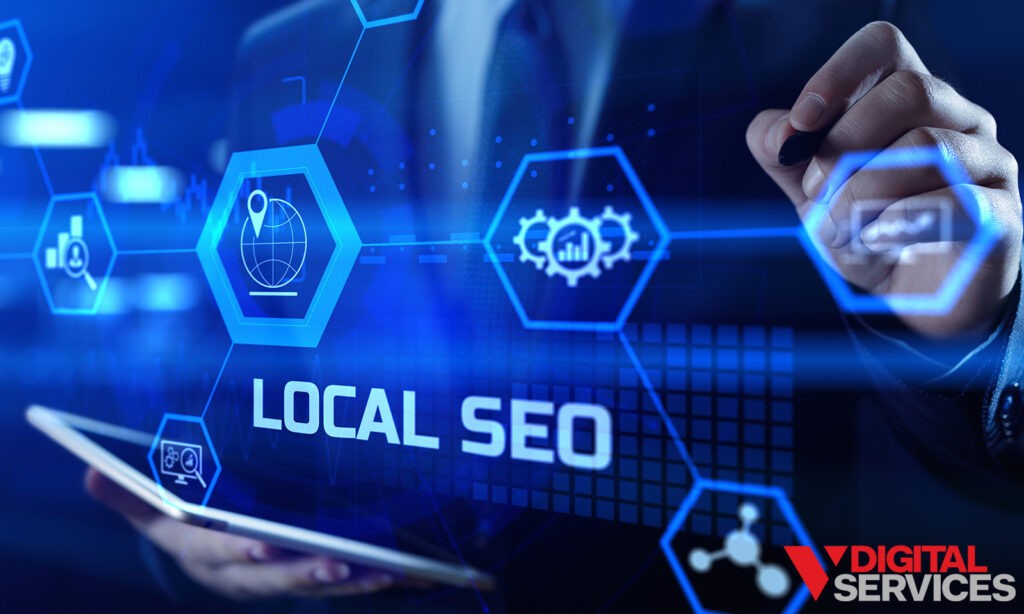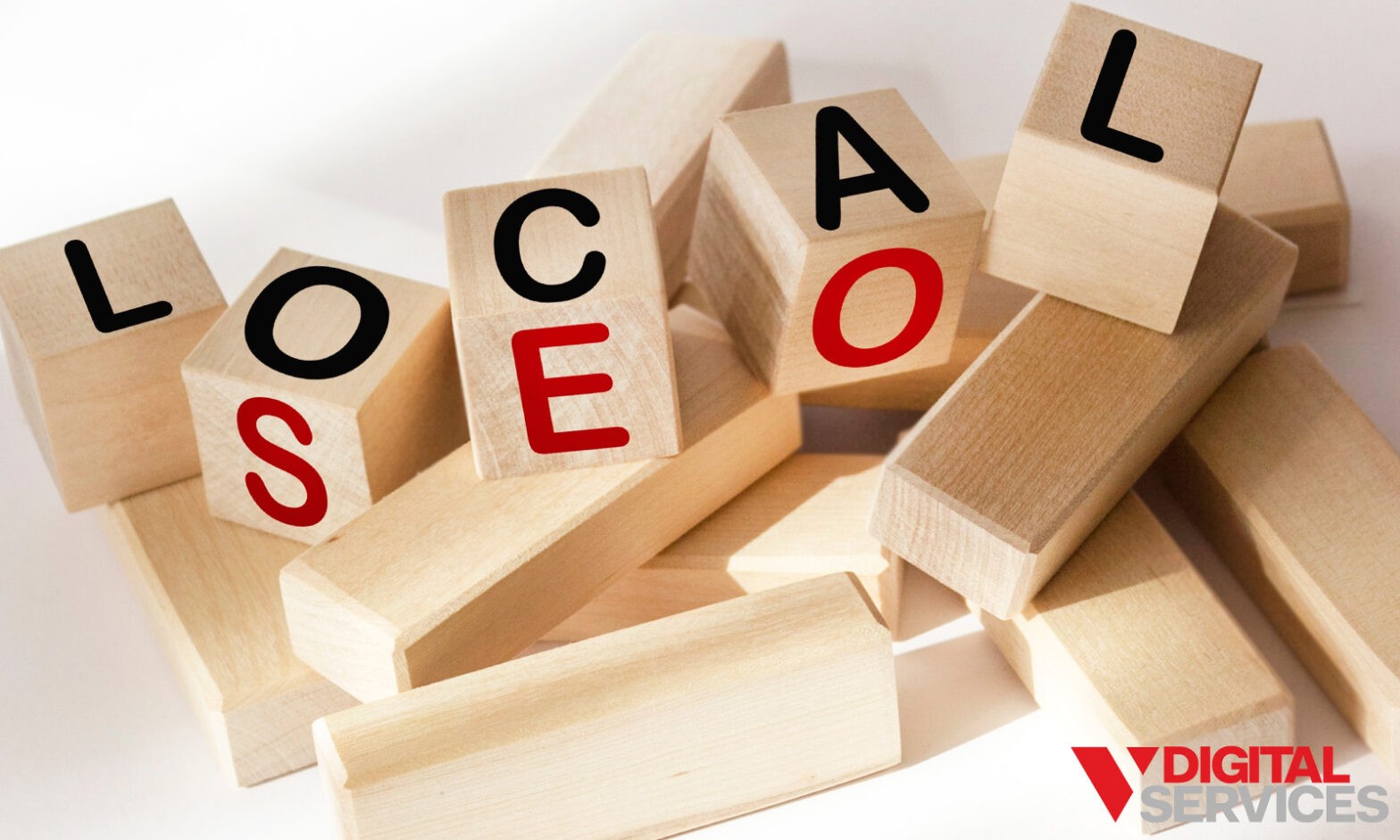Online visibility is an essential digital marketing component for businesses of all types and sizes, which is why many have warmly embraced search engine optimization (SEO) as a staple of their marketing strategy. But as the landscape of search becomes more sophisticated, a new facet of SEO has emerged that businesses – particularly those with brick-and-mortar locations – cannot afford to ignore: local SEO.
As people increasingly search for products, services, and businesses “near me” or within their vicinity, local SEO has become a vital tool in connecting businesses to their immediate communities. In this guide, we’re breaking down the importance of SEO, making it easy for you to see why it might just be the smartest marketing move you could ever make.
What is Local SEO?
Local search engine optimization (SEO) is the practice of enhancing a business’s online presence to attract local customers from relevant local searches. These searches typically take place on Google or other search engines like Bing. Essentially, while general SEO focuses on improving your site’s visibility on a national or global scale, local SEO narrows down this focus to reach potential customers in your immediate vicinity or a specified location.
In recent years, there’s been a significant surge in “near me” searches. With the increasing use of mobile devices for search queries, users are now expecting results tailored to their current location, be it a service, product, or place. Local SEO ensures that when potential customers make such searches, they find your business.
Local SEO vs. General SEO
So, what’s the difference between general SEO and local SEO? The primary difference lies in the intent and the results.
For instance, if someone types in “best Italian restaurant,” Google assumes the user is looking for options in their current location, even if they don’t specify a city or area. Google’s advanced algorithms will then prioritize Italian restaurants near the user. Local SEO tactics ensure that your business is one of those top results.
Components of Local SEO
There are several different factors that come into play for local SEO, including:
- Google Business Profile: One of the pivotal tools in local SEO, Google Business Profile is a free tool from Google that allows businesses to manage their online presence across Google, including Search and Maps. By verifying and updating your business information, you can both improve customer engagement and increase your chances of appearing in local search results.
- Online Reviews: For local businesses, online reviews are crucial. They not only bolster a company’s reputation but also provide signals to search engines about the trustworthiness and popularity of a business. Encouraging satisfied customers to leave positive reviews and promptly addressing negative ones can significantly impact local search rankings.
- Local Backlinks: Just as backlinks are crucial for traditional SEO, local backlinks (or links from other local businesses and organizations) are vital for local SEO. They signal to search engines that your business is reputable and relevant within the local community.
- On-Page SEO Elements: These include localized content, the addition of a local business schema, and ensuring contact details (Name, Address, Phone, commonly termed as NAP) are consistent across all platforms.
- Local Citations: These are online mentions of your business, which can be found on directories like Yelp, Yellow Pages, and TripAdvisor. Consistency in these citations is essential, as discrepancies in details like address or phone number can confuse search engines and customers.
- Localized Content Creation: It’s not just about having consistent NAP details or a GMB listing. Local SEO also thrives on creating content tailored to the local audience. This might include blog posts about local events, news, or any other content that resonates with the local audience.
Local SEO is a powerful tool for small and large businesses alike, particularly those with brick-and-mortar locations. It blends traditional SEO practices with localized tactics to ensure your business stands out in local searches. As local searches continue to rise with the widespread use of smartphones, prioritizing local SEO is not just a benefit but a necessity for businesses aiming to stay ahead in the digital landscape.
How Does Local SEO Work?
Local SEO hinges on algorithms, which are rules that search engines like Google use to deliver the most relevant results to users. However, with local SEO, the focus sharpens on local relevancy and proximity.
We’ve already touched on some of the factors that influence local SEO rankings, but here’s a closer look at how it operates:
- Proximity-based Search Results: At its core, local SEO operates on the principle of proximity. When a user searches for a service or product in a specific area or uses queries with “near me,” search engines pull up results based on businesses closest to the user’s current location (or the specified area).
- Local Search Ranking Factors: Search engines use several factors to rank local businesses:
- Relevance: How closely a local listing matches what someone is searching for. Ensuring your business information is complete and accurate can help improve its relevance to specific searches.
- Distance: How far each potential search result is from the location term used in a search. If a user doesn’t specify a location, Google will calculate distance based on what’s known about their location.
- Prominence: Refers to how well-known a business is. Some places are more prominent in the offline world, and search engines try to reflect this online. This includes links, articles, directories, and more.
- The Role of Online Directories and Citations: When your business information (like name, address, and phone number) appears on directory websites (e.g., Yelp, Yellow Pages, TripAdvisor), these are called “citations.” Consistent citations across various platforms signal to search engines that your business is legitimate, ultimately aiding in improving your local search ranking.
- Customer Reviews and Ratings: Search engines, especially Google, take into account the number, quality, and recency of reviews on your Google Business Profile and other platforms. A business with numerous positive reviews will naturally rank higher than one with fewer or negative reviews.
- Localized Content Optimization: Content optimized for local keywords plays a significant role in local SEO. For instance, a bakery in Chicago would benefit from content optimized around keywords like “best Chicago bakery” or “fresh bread in Chicago.”
- Mobile Optimization and Local SEO: With a vast majority of local searches coming from mobile devices, having a mobile-optimized website is indispensable. Search engines prioritize mobile-friendly sites in search results, especially for local queries.
- Local Backlinks: While backlinks (links to your site from other websites) are a cornerstone of traditional SEO, local SEO places importance on backlinks from local websites, newspapers, and organizations. These provide robust local signals to search engines about your business’s relevancy in the local ecosystem.
- Behavioral Signals: Search engines also consider user behavior – for instance, click-through rates, check-ins, and even the duration users spend on your site after finding it through local search.
Local SEO is a complex combination of traditional SEO practices enhanced with strategies specifically focused on geographical relevance. It’s about convincing search engines that your business is the most relevant option for users in a specific location, especially when they’re making location-based queries. By understanding how local SEO operates, as well as the massive importance of local SEO, businesses can better position themselves in an increasingly digital world where proximity and local relevance play pivotal roles.

Why is Local SEO Important?
While traditional SEO practices lay the foundation for online visibility, local SEO hones in on connecting businesses to their immediate communities. Based on that alone, you can begin to understand why local SEO is important to the success of your business.
When you take a closer look at all of the benefits of local SEO, there’s no question that it can have a significant impact – both in terms of visibility and tangible, sustainable business growth.
1. It is an extremely cost-effective marketing strategy.
In the realm of marketing, ensuring the best returns for your investment is key, and this is where local SEO shines. Traditional marketing methods, such as billboards or print ads, demand not only a considerable initial financial outlay but also recurring costs for sustained visibility. Think about the recurring rentals for billboard spaces or the repeated costs of running magazine ads. On the other hand, radio spots, while offering wider reach, are time-bound, meaning your message is fleeting and might not be heard by your target audience at all times.
Enter local SEO, a solution that is not only more budget-friendly but also ensures sustained visibility for your business. Once you’ve set the foundation and optimized your online presence for local searches, the ongoing costs are minimal compared to traditional methods. You aren’t paying per impression or per space; instead, you’re leveraging the organic reach that search engines offer.
Furthermore, local SEO doesn’t just blanket-target an audience. It is inherently designed for specificity. This means that your marketing dollars are spent drawing in a crowd that’s actively searching for your services in your vicinity. So, not only are you spending less, but the leads you attract are also more qualified, leading to a higher conversion rate.
Imagine a scenario where a potential customer is searching for a “bookstore near me.” If your local bookstore is optimized for local search, it will appear in the results, bringing in a customer who is already interested in making a purchase. This direct intent-based marketing is what makes local SEO so cost-effective.
Local SEO provides businesses, especially small to medium ones, the opportunity to compete in a crowded market without burning a hole in their pockets. It is a smart, modern method for getting the best bang for your marketing buck.
2. It boosts mobile searches.
The role of smartphones in shaping consumers’ buying decisions cannot be emphasized enough. It’s not just about calls or texts anymore; these pocket-sized powerhouses have become primary tools for research, discovery, and making purchasing decisions. As a result, mobile searches, especially those with local intent, have seen an exponential rise.
When someone is out and about, taking a stroll downtown or exploring a new neighborhood, and they feel the urge to grab a coffee or need to find the nearest hardware store, they’re likely to whip out their phone and type in “best coffee shop near me” or “hardware store nearby.” These are intent-rich moments where decisions are made, often referred to as “micro-moments” in the marketing world. It’s in these critical moments that local SEO plays its part.
By optimizing your business for local SEO, you ensure that when these micro-moments happen in your business’s vicinity, your name pops up at the top of their search results. But beyond visibility, ensuring your business details are accurate, like phone numbers, opening hours, and addresses, means that a potential customer can go from discovery to making a purchase within minutes. The ease and convenience of finding exactly what they’re looking for, right when they want it, can influence a consumer’s decision heavily in your favor.
Also, with features like click-to-call and map directions integrated into search results, the journey from a search to a store visit is streamlined. For instance, if someone’s searching for a “shoe store near me” and your store pops up with the latest collection highlighted, the chances of that person visiting and making a purchase increase manifold.
When push comes to shove, local SEO is all about being visible at the right time to the right people. By boosting your presence in mobile searches, you position your business to capitalize on these spontaneous, intent-rich moments, driving foot traffic and increasing the likelihood of immediate sales.
3. It attracts new business.
Local SEO is like a powerful magnet attracting potential customers to your business, even if they’ve never heard of you before. When your business ranks highly for local searches, it captures the attention of users looking for services or products in your area. As digital storefronts become more integrated with physical locations, this visibility becomes paramount.
Imagine someone moving to your town and looking for a “dentist near me” or a “local Italian restaurant.” If your business is optimized for local SEO, you’re in a prime position to welcome this individual as a new customer having not known about your dental practice or your Italian eatery before, Thanks to your local search prominence, they’re now considering booking an appointment or reserving a table.
This inherent power of discovery is what makes Local SEO invaluable. Every day, countless people perform searches with local intent, and every one of those searches represents a potential new customer, a new opportunity. In essence, Local SEO acts as a beacon, guiding these searchers to your doorstep and turning mere online searches into tangible business opportunities, giving you an advantage over competitors who remain in the shadows of online obscurity.
4. It builds trust and credibility.
Trust is a cornerstone of any business relationship. In an online world filled with choices, customers gravitate towards businesses they feel they can trust. Local SEO plays an instrumental role in building this trust and establishing your business’s credibility.
When a user performs a local search, and your business pops up consistently with positive reviews, it paints a picture of reliability. It signals to the user that not only is your business locally relevant, but it’s also endorsed by other community members. Think of it as a digital word-of-mouth where positive local reviews act as recommendations, assuring potential customers of your quality and service.
Additionally, featuring prominently on well-regarded directories and local listings also plays into this narrative of trust. For example, a business listed on Google Business Profiles with updated information, photos, and reviews is often seen as more reputable than one with scant details. Being on these platforms doesn’t just boost your visibility; it’s an endorsement of your legitimacy.
And there’s more to it than just trust. Credibility in the online world also hinges on consistency. If a customer finds your business details—like name, address, and phone number—consistent across various platforms, it reinforces your authenticity. Discrepancies or outdated information, on the other hand, can raise red flags.
5. It increases website traffic.
The beauty of local SEO lies in its dual approach to driving customers. While the primary objective might be to drive foot traffic to a brick-and-mortar location, a strong local online presence simultaneously boosts visits to your website. When users see your business listed in local search results with positive reviews and a clear location, their curiosity often leads them to click on your website to learn more.
Even better, these visitors are highly targeted and already interested in what you have to offer, making them more likely to engage with your content, sign up for newsletters, or even make an online purchase. Essentially, a boost in local search rankings isn’t just about physical visibility—it amplifies your digital footprint and drives high-quality, relevant traffic to your site.
6. It provides valuable insights.
Using tools like Google Business Profile Analytics, businesses can uncover data about how customers are finding them—whether directly or through discovery searches—and what actions they take once they find the listing. You can pinpoint the number of calls made directly from your listing, get a breakdown of search queries used to find your business, and even understand how many customers asked for directions to your establishment.
This granular data goes beyond just vanity metrics. Knowing peak times for calls or direction requests, for instance, can inform staffing decisions. Understanding search queries can influence content creation or even the services/products you highlight. In the big picture, the insights gained from local SEO tools offer a window into customer behavior and preferences, enabling businesses to adapt and cater more precisely to their local audience.
7. It empowers you to leverage hyper-targeted marketing.
Broad marketing campaigns cast wide nets, but local SEO provides unparalleled precision. It allows businesses to focus their marketing efforts on specific locales or even neighborhoods. Say you’re a restaurant planning a special menu for a local festival. With local SEO, you can target promotions specifically to residents in that area or people who might be visiting during the event.
The ability to hyper-target also allows businesses to segment and target based on local events, cultural nuances, and even the specific needs of a community. This kind of hyper-local personalization ensures that your marketing messages resonate deeply, leading to better engagement and conversion rates.
8. It levels the playing field.
Nowadays, small businesses can indeed defeat corporate giants, thanks to local SEO. While larger enterprises have vast resources for nationwide or even global marketing campaigns, they can’t replicate the authentic local connection that smaller businesses often have. Local SEO provides smaller businesses the ability to combat bigger brands effectively.
Let’s take the example of a local bookstore trying to compete against a giant chain. While the chain might have more outlets and bigger ads, the local bookstore, through effective local SEO, can dominate local search results. It can highlight unique events, community interactions, or even locally relevant book collections. This not only gives them visibility but also solidifies their position as a community staple.

Learn How to Use Local SEO to Achieve Your Goals
As the online world expands, there’s increasing demand for personalized, local experiences. Local SEO bridges the gap between businesses and their communities, ensuring that the two can find each other in the vast digital landscape.
At V Digital Services, our local SEO strategists will help you develop a tailored strategy based on your needs and goals, mapping out detailed plans that deliver measurable progress. Whether you’re a small business owner trying to make a mark in your neighborhood or a larger franchise aiming to cater to various localities, our local SEO services are an invaluable tool.
For more information about how local SEO benefits your business, contact V Digital Services today!
Photo Credits:
Sviatlana Zyhmantovic
SWKStock
Evgenii Lapshin
BestForBest



 PREVIOUS
PREVIOUS